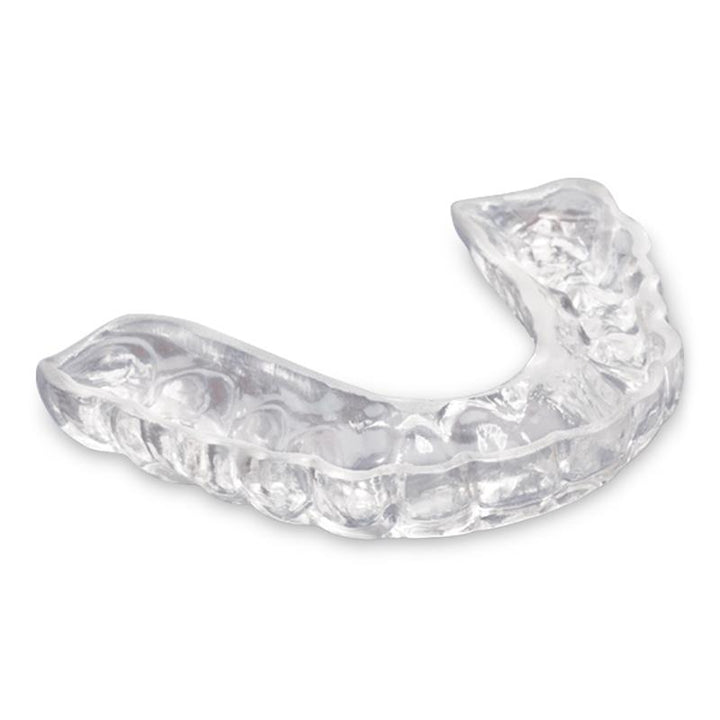By protecting your teeth and gums, a night guard can make a big difference in your oral health. It should cut down your chances of getting chipped teeth, cavities, and gum disease. But if you’ve noticed white or yellow buildup on your night guard, you might be wondering whether your night guard is introducing its own bacteria problems.
Are you concerned about night guard buildup and how to get rid of it? Well, you’ve come to the right place.
That buildup is caused by bacteria.
Those areas of buildup are often referred to as “calcium” deposits, but they’re not really composed of calcium as much as a mixture of many things that have “calcified.” At any given time, there are over six billion bacteria making a home in your mouth. Sounds gross, right? But it isn’t all bad. Some of those bacteria are working to protect your teeth and gums while others are the culprits behind tooth decay and gum disease.
Your saliva actually performs important work in assisting the good bacteria and fighting the bad bacteria, which it why it’s important to address problems like dry mouth. However, when you don’t clean your mouth guard on a regular basis, saliva combines with bacteria on the guard as well as plaque and tartar to form calcified areas that appear white or yellowish. Without proper cleaning, these areas will continue to build up over time and can even affect the way a night guard fits over your teeth.
The solution is to clean your night guard regularly.
Because of how much bacteria lives in your mouth, it’s important to clean your night guard after every use. Otherwise, you’ll be putting away your moist guard in a tight plastic case where that bacteria will simply proliferate. In fact, mold can begin to grow on the guard if you don’t clean and dry it before storing it for the day.
There are a number of methods you can use to clean your guard.
- You can brush your guard with a soft toothbrush and non-abrasive toothpaste. You don’t want to scratch the plastic with a hard brush because creating scratches in the plastic will actually give bacteria more surfaces on which to grow.
- You can use a denture cleaner, dental guard cleaner, or mouthwash to clean the night guard (just don’t use a mouthwash that contains alcohol because this can affect the durability of the plastic over time).
- You can soak your guard in white vinegar or hydrogen peroxide for 30 minutes. If you want a deep clean, you can do thirty minutes of vinegar, then rinse the guard, and follow up with thirty minutes of hydrogen peroxide. However, keep an eye on the time. You do not want to soak your guard all day.
When you rinse the night guard after using any one of these methods, be sure to rinse with cool or warm water. Hot water can soften and shrink the plastic materials of some night guards.
Always dry your night guard before storing it.
Once you’ve cleaned and rinsed your guard, you don’t just want to throw it in its case for the day. That’s because moisture promotes bacteria growth. So, you want your guard and its case to be completely dry.
If you’re in too much of a rush in the morning to let the guard air dry, you can use a hair dryer on low heat to help speed up the process. It is best not to wipe your guard with a cloth that can leave lint behind or with a bathroom towel that may harbor bacteria.
Take time to clean your night guard case on a weekly basis.
The case your guard stays in all day can contribute to bacterial growth if it is not regularly cleaned. Even if you use the case to soak the guard, you will still need to make sure you clean the inside of the top of the case since it was likely not immersed during the soaking process.
As with your night guard, the case should be completely dry before your close it up for the day. It’s important to find a way to fit these routines into your morning and your week so that the case and night guard do not have the chance to support bacterial growth all day long.
Replace your night guard in a timely manner.
Your night guard will show signs of wear and tear over time (the wear and tear you are protecting your teeth against). A guard with lots of scratches and abrasions will harbor more bacteria than a smooth one. And a night guard with visible cracks has lost its structural integrity and may no longer fit snugly.
How often you need to replace your night guard depends on how aggressively you grind, what density of plastic you chose for your night guard, and how well you care for your night guard. If you want your night guard to last a long time before replacement, take care of it well and choose a guard with greater density.
Fortunately, you have a wide range of custom night guard choices at TeethNightGuard.
JOIN OUR NEWSLETTER! RECEIVE PROMOTIONS & COUPONS FOR CUSTOM DENTAL NIGHT GUARDS
INTERESTED IN BECOMING AN AFFILIATE OF TeethNightGuard.com?
Earn a 15% commission for simply sharing with your friends and family through email or social media such as Facebook, Reddit, or Twitter. Sign up and learn more here: https://www.teethnightguard.com/pages/register-affiliate-account
HARD ACRYLIC 2MM -3MM DENTAL NIGHT GUARD - HARD AND RIGID GUARD(CUSTOMIZATION AVAILABLE ON ORDER PAGE TO SELECT THICKNESS)

$159.99
Item Number HARDMG Manufacturer Sparkling White Smiles Dental Lab Rating Product Description 2mm - 3mm Hard Acrylic Professionally made Custom Night Guard Our Custom Teeth Night Guards are BPA, Latex and Phthalate Free Night Guard designed for severe teeth grinding/bruxism. This Night Guard… Read More